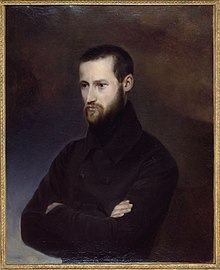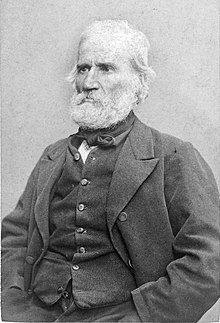Louis-Auguste Blanqui
Louis-Auguste Blanqui [ lwi oˈgyst blɑ̃ˈki ] (born February 7, 1805 in Puget-Théniers , Département Alpes-Maritimes , † January 1, 1881 in Paris ) was a French revolutionary , theorist and 1871 member of the Paris Commune .
Life and work
Youth and education
He was born in 1805 as the son of Jean-Dominique Blanqui and brother of the economist Adolphe Jérôme Blanqui . He studied law and medicine , but soon found his calling in political engagement. His intellectual and political career was influenced by the theories of François Noël Babeuf , Charles Fourier and Claude-Henri Comte de Saint-Simon .
Revolutionary activity
Blanqui participated in the fall of Charles X in the July Revolution of 1830 . From 1831 on he organized secret republican and socialist societies and headed the secret society of the seasons . In August 1833 he married the nineteen-year-old Amélie-Suzanne Serre, daughter of a lawyer.
The resignation of the cabinet under Molé, the convening of a transitional cabinet, as well as an economic crisis and unemployment led to a tense situation in France in 1837. Blanqui organized an armed uprising with Armand Barbès and other members of the secret society, which was crushed in Paris on May 12 and 13, 1839. The leaders of the uprising are tried and Barbès is sentenced to death. Blanqui himself initially remains fleeting. Louis-Philippe I turns Barbès' death sentence into a prison sentence on Mont-Saint-Michel . In October 1839 Blanqui was arrested and sentenced to life imprisonment for participating in the failed uprising against the "citizen king" Louis Philippe . The conditions of detention (e.g. deprivation of food, dark detention in the cachots noirs ) on Mont-Saint-Michel repeatedly lead to unrest, hunger strikes and suicide attempts among political prisoners. The conditions on Mont-Saint-Michel lead the House of Representatives to discuss reform of the prison system. The Commission's rapporteur is Alexis de Tocqueville ; these developments lead to changes in the prison from 1844 onwards. While in prison (1841), at the age of twenty-six, his wife Amélie-Suzanne dies.
After nine years he was pardoned and appeared in the same year as spokesman for the left in the Paris June uprising of 1848. He was then arrested again and sentenced to ten years in prison. There he drafted his own socialist theory, at the center of which was the idea of a dictatorship of the proletariat : "The fact that France is bursting with armed workers is the beginning of socialism ". After his release and renewed conviction and imprisonment in the years 1861-1865, he went into exile in Belgium to continue his fight from there.
After the general amnesty in 1869, he returned to France. On August 14th: 1870 an attempt by the Blanquists in the Boulevard de la Villette fails. After the proclamation of the III. Republic on September 4, 1870, Blanqui becomes editor of the magazine "La Patrie en Danger", commander of the 169th battalion. After the capitulation of France, he withdrew from Paris disappointed and was arrested on March 9, 1871 and held in a secret location. He was not involved in the Paris Commune , but was elected a member of the Paris Commune on March 26th. The government of Adolphe Thiers refused to exchange it with the Archbishop of Paris, who had been imprisoned by the Commune . In prison, influenced by Pierre-Simon Laplace and Jérôme Lalande , he wrote the cosmological work L'éternité par les astres . The basic theses are u. a. an infinite connection of all animate and inanimate phenomena with each other and the existence of “doppelganger universes” in which all possible developments have their real counterpart ( see also possible world ). He was pardoned in 1879. Blanqui died in 1881.
Work and effect
Shortly before his death he wrote his main work, the Critique sociale , which was only published posthumously in 1885.
Blanqui had a great influence on later communist and socialist movements. His followers, the Blanquists , eventually joined the French Socialist Party .
References and footnotes
literature
- Karl Hans Bergmann : Blanqui. A rebel in the 19th century. Campus, Frankfurt am Main 1986, ISBN 3-593-33593-X .
- Auguste Blanqui : Instructions for the Insurrection. Articles, speeches, appeals . Edited and introduced by Frank Deppe , EVA Europäische Verlagsanstalt, Frankfurt am Main / Europa Verlag , Vienna, 1968 DNB 456132627
- Auguste Blanqui: Eternity through the stars . With a foreword by Jacques Rancière . From the French by Daniel Zumbühl, bahoe books , Vienna 2017, ISBN 978-3-903022-51-5
- Frank Deppe : Conspiracy, Insurrection and Revolution. Blanqui and the problem of the social revolution in the 19th century. EVA European Publishing House , Frankfurt am Main 1970 DNB 456331514 (also dissertation at the University of Marburg ).
- Alexis de Tocqueville : memories. Stuttgart 1954, new edition, translated by Dirk Forster, Karolinger Verlag, Vienna / Leipzig 2010, ISBN 978-3-85418-139-2 .
- Auguste Blanqui: Ni Dieu ni maître. Anthology, Éditions Aden, 2009 ( content )
Web links
- Literature by and about Louis-Auguste Blanqui in the catalog of the German National Library
- The Louis-Auguste Blanqui Internet Archive (English) (French) at marxists.org
- Works in the digital library Les classiques des sciences sociales .
- Editor / EB: Blanqui, Auguste. In: Historical Lexicon of Switzerland .
- Publications by and about Louis-Auguste Blanqui in the Helveticat catalog of the Swiss National Library
| personal data | |
|---|---|
| SURNAME | Blanqui, Louis-Auguste |
| BRIEF DESCRIPTION | French, revolutionary and socialist theorist |
| DATE OF BIRTH | February 7, 1805 |
| PLACE OF BIRTH | Puget-Théniers |
| DATE OF DEATH | January 1, 1881 |
| Place of death | Paris |

